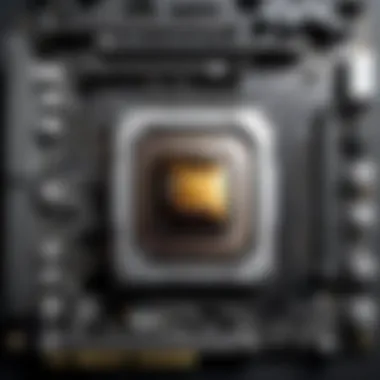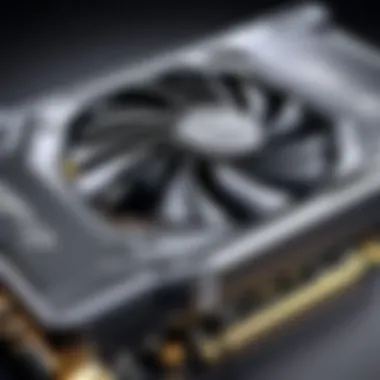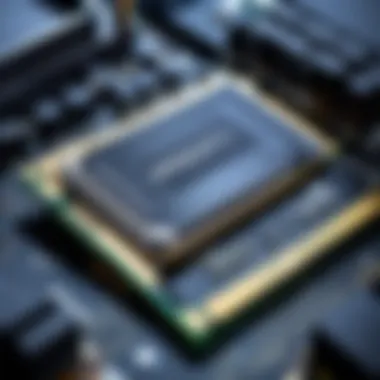Choosing the Best Gaming Computer: Key Considerations


Intro
In an era where digital interaction is integral to everyday life, gaming has evolved beyond mere entertainment. Its rise into a mainstream form of competition known as esports reflects this evolution. Choosing the right computer for gaming is vital, especially as technology continues to advance rapidly.
Purchasing a gaming computer involves understanding key components that directly impact performance. This guide will explore these components, their specifications, and how they relate to modern gaming demands. The discussion will include processors, graphics cards, memory, and storage, among others. Additionally, considerations about the physical design of the hardware will also be elucidated. Future-proofing will be a focal point, ensuring that users do not just meet current requirements but are also prepared for upcoming advancements.
As we navigate the complexities of gaming technology, the ultimate aim is to create an informed decision-making process for all aspiring gamers. Understanding the nuances of hardware, alongside budgetary constraints, facilitates a more rewarding gaming experience.
This guide is designed for esports enthusiasts, technology aficionados, and gaming fanatics who seek a deeper insight into their gaming hardware choices.
Understanding Gaming Requirements
When embarking on the journey of selecting a gaming computer, understanding gaming requirements is crucial. This section delineates the essential factors that affect gaming performance and helps set a foundation for informed choices. Knowing what kind of games you aim to play significantly shapes the specifications and features you should prioritize.
Modern gaming is not merely about aesthetics or sheer processing power; it is about aligning a system's capabilities with personal preferences and gaming styles. This can prevent costly mistakes and ensure that the investment translates into an enjoyable experience. Moreover, a deep grasp of your gaming habits enables you to analyze the technical specifications that best cater to your unique needs.
Defining Your Gaming Preferences
For many individuals, gaming is more than a pastime; it is an engagement with intricately designed worlds and thrilling challenges. Defining your gaming preferences begins with identifying your niche. Are you drawn to fast-paced shooters, immersive role-playing games, or intricate strategy titles? This decision isn’t trivial; it influences your hardware choices.
- Type of games: Different genres impose varying requirements on hardware. For instance, first-person shooters typically demand high-performance graphics cards for seamless visuals.
- Desired settings: Playing games at lower settings reduces the demand on hardware, which might allow for a less expensive build. Conversely, if high-resolution graphics are essential, a strong GPU becomes non-negotiable.
- Expected frame rates: High frame rates can enhance gameplay, especially in competitive genres. For instance, esports players often favor systems that can achieve steady frame rates of 144 fps or more.
Understanding these nuances permits a tailored purchase, ideally suited to your gameplay preferences.
The Role of Game Genres
Different game genres entail specific computational demands. Each genre presents its own set of characteristics that can influence the choice of components. It is important to explore these requirements to find a computer that best matches your gaming aspirations.
- Action and shooters: These games are graphics-heavy and require potent graphics processing units. Fast response times and higher refresh rate monitors are particularly advantageous.
- Role-playing games: These often emphasize elaborate graphics, rich storylines, and expansive worlds. Here, a blend of CPU and GPU performance matters.
- Simulation and strategy games: These genres can occasionally be less demanding but still require adequate RAM for multitasking during gameplay.
- Indie games: While they are often simpler in design, verifying system requirements is still essential to ensure compatibility.
To summarize, understanding how your preferred game genres impact hardware requirements can help you make informed specifications choices.
Recognizing these diverse needs ensures that the computer you choose will not only accommodate your current gaming desires but also enhance future experiences.
Key Specifications for Gaming Computers
When selecting a computer specifically for gaming, the specifications of the machine play a crucial role. These specifications determine how well the computer can perform under the demanding scenarios that modern games present. Several key elements contribute to this performance, including the CPU, GPU, RAM, and storage options.
CPU: The Heart of Performance
Understanding Clock Speeds
Clock speed, measured in gigahertz (GHz), is one of the most critical parameters of a CPU. It indicates how many cycles per second the CPU can execute. Higher clock speeds generally contribute to better performance in games. It's essential for processing tasks quickly and efficiently, especially in CPU-intensive games. However, clock speed alone does not assure performance; it must be viewed alongside core count and architecture.
Core Count Considerations


Core count determines how many tasks a CPU can handle simultaneously. More cores often mean that the CPU can manage multiple threads efficiently, which is particularly beneficial for multi-threaded games. Gamers should consider CPUs with a higher core count, such as the AMD Ryzen 5 or Intel i7, as they offer better performance in many contemporary titles. Choosing the right core count can lead to smoother gaming experiences, especially in complex scenarios.
GPU: Graphics Processing Power
Dedicated vs Integrated Graphics
Dedicated graphics cards are essential for serious gaming. Unlike integrated graphics, which share resources with the CPU, dedicated GPUs have their memory and processing power. This separation allows for much better performance in graphics-hungry games. Most gaming computers should ideally have a dedicated GPU, like the Nvidia GeForce RTX series or AMD Radeon RX series, to ensure high frame rates and stunning visuals. Integrated graphics, while suitable for less demanding tasks, typically fall short in delivering the level of performance needed for intense gaming.
Latest GPU Technologies
The gaming landscape continually evolves, with new GPU technologies providing enhancements in visual fidelity and performance. Features like ray tracing and AI-enhanced graphics are becoming increasingly common. Utilizing the latest GPU technologies means gamers can experience richer graphics and performance boosts. It's important to stay updated on these advancements, as they can significantly influence how games look and run.
RAM: Memory Requirements
Importance of Capacity
Capacity of RAM is vital for gaming. Generally, 16GB is considered the baseline for most gaming machines nowadays. Insufficient RAM can cause games to stutter and hamper multitasking capabilities. Gamers should assess their gaming habits and choose a capacity that aligns with their needs. DDR4 RAM is prevalent due to its effective performance in gaming tasks.
Speed and Latency Factors
The speed of RAM, measured in megahertz (MHz), along with latency, influences how quickly data can be accessed by the CPU. High-speed RAM can aid in better frame rates and overall performance, especially in fast-paced games. While having faster RAM is beneficial, ensure that it is compatible with your hardware; otherwise, performance gains can be minimal.
Storage Options for Gamers
SSDs vs HDDs
Solid State Drives (SSDs) are increasingly popular among gamers due to their faster load times compared to traditional Hard Disk Drives (HDDs). An SSD can drastically reduce boot and load times, which is vital in gaming scenarios. Many gamers opt for a combination of both, using an SSD for the operating system and key games, while relying on an HDD for additional storage.
Understanding Storage Capacity Needs
As game sizes increase, it is essential to consider how much storage a gaming rig will need. Games today may require upwards of 100GB each. It is wise to assess both current and future storage needs when making a choice. Using external drives can also provide additional options for expanding storage without heavily investing in internal upgrades.
Choosing the Right Form Factor
The form factor of a gaming computer plays a crucial role in both performance and usability. Various factors like space, portability, and expansion options significantly influence the decision. Understanding these aspects can lead to a more satisfying gaming experience. The choice between a desktop or a laptop, for instance, is not purely about preference but also about how each option fulfills specific gaming needs.
Desktop vs Laptop
Choosing between a desktop and a laptop is one of the first decisions gamers face. Desktops generally offer greater power and performance. They usually house more powerful hardware, capable of running demanding games at higher settings. An additional advantage is that desktops provide better upgrade potential. Users can swap out components, enhancing performance over time.
However, desktops require dedicated space. They typically need a desk, monitor, and additional peripherals. This could be a limitation for users who value portability.
Laptops, on the other hand, are portable. They can go almost anywhere, making them suitable for gamers who travel or have limited space. Certain models, especially gaming laptops like the Alienware x17 or Razer Blade 15, offer good performance. Yet, they often come with some trade-offs. Upgrading components like the CPU or GPU can be challenging in laptops.
"The choice between desktops and laptops comes down to balancing power needs with lifestyle and mobility."
Custom Builds vs Pre-built Models


When selecting a desktop, another essential consideration is whether to go for a custom build or a pre-built model. Custom builds offer flexibility and can be tailored to specific gaming needs. Users select each component, ensuring the best compatibility and performance. This route can save money if you are knowledgeable about computer parts.
However, building a PC requires time and technical skills. Not all users may feel comfortable with the assembly process or component selection.
Pre-built models, like those from ASUS or HP, provide a ready-to-use solution. They often come with warranties and technical support, which may appeal to less experienced users. Yet, they can be more expensive for the same performance level compared to custom builds.
Budget Considerations
When selecting a gaming computer, budget considerations play a critical role. It is vital to understand that the gaming experience can vary significantly depending on how much you invest. By establishing a budget, you can effectively narrow down your options, ensure you get the necessary components, and avoid overspending. This section will explore how to set a reasonable gaming budget and evaluate the performance you can expect at different price points.
Establishing a Gaming Budget
Setting a gaming budget involves several factors that can help guide your decisions. A good starting point is to determine what type of games you intend to play. Many modern games have specific hardware requirements that can influence pricing. For example, competitive titles such as League of Legends may not need as potent a system as graphically demanding games like Cyberpunk 2077.
To break it down:
- Identify your needs: What is the primary use of the computer? Will it be for casual gaming or more demanding titles?
- Benchmark technology: Research the recommended specifications for the games that you plan to play. This information is crucial in establishing a baseline.
- Assess your current equipment: If you are upgrading, consider what components can be reused. This approach may allow for a more sizable budget for new parts.
Value for Performance
Once you've established your budget, it is equally important to focus on value for performance. In gaming, this translates to finding the best hardware that meets your performance needs without exceeding your budget. Understanding value encompasses knowing the price-to-performance ratio of components like the CPU, GPU, and RAM.
Here are some key points to consider:
- Research brands: Some manufacturers have strong reputations for quality and performance. Brands such as ASUS, MSI, and AMD often deliver reliable options.
- Look for sales: Timing your purchase for special sales events like Black Friday may lead to significant savings.
- Consider future upgrades: Sometimes spending a bit more on a modular system can provide better long-term value, especially if it allows for easier upgrade paths.
"Investing wisely in a gaming rig is about balancing initial costs with future performance potential."
Following these guidelines will help ensure that your gaming experience is not only satisfactory but also aligns with your financial plan.
Brand Assessment
Choosing a computer for gaming involves more than just technology specifications. Brand assessment plays a crucial role in this process. The reputation of a brand can significantly impact the performance, reliability, and quality of your gaming experience. A well-known brand often reflects years of innovation, customer feedback, and established support structures, making it easier for consumers to trust their products. In the gaming environment, a robust brand often ensures compatibility with a broader range of games, software updates, and enhanced user experiences.
When evaluating brands, there are several elements to consider. First, look at customer support. Reliable after-sales service can save significant time and effort, especially if technical issues arise. Next, consider the community engagement the brand has. Brands that foster active communities tend to offer better ecosystems around their products, including user guides, forums, and troubleshooting aides.
Moreover, the value of performance benchmarks cannot be overstated. Trusted brands often undergo stringent testing that can reveal performance metrics you can rely on in intense gaming scenarios. Overall, brand assessment is essential in not only choosing a product but also ensuring that the investment will meet your long-term gaming needs.
Leading Technology Brands
Among leading technology brands, some stand out due to their commitment to quality and innovation. Asus has made a significant mark in the gaming arena with its ROG (Republic of Gamers) line, which offers high-performance hardware specifically tailored for gamers. Their products are known for excellent cooling systems and robust build quality.
MSI is another brand that has become synonymous with gaming. They provide a wide range of gaming laptops and desktops that boast impressive graphics and superior processing capabilities. The company places a strong emphasis on aesthetics as well, with eye-catching designs preferred by many gamers.
Acer is a noteworthy mention due to its Predator series. This brand provides a balanced mix of performance and affordability, making it a favored choice for many enthusiasts who seek higher specifications without breaking the bank. The combination of performance, design, and support from these brands often leads to a satisfactory gaming experience.


It's not just about high-end specs. Many gamers also consider the customizability offered by brands like Corsair and Razer, which excel in peripherals. High-quality keyboards, mice, and headsets contribute significantly to gameplay, impacting both performance and comfort during long gaming sessions.
Emerging Brands Worth Considering
While established brands indeed have a robust following, emerging brands should not be overlooked. These companies often provide innovative features at competitive prices, which can attract the attention of budget-conscious gamers. Take Skytech Gaming, for instance. This brand is gaining traction for its custom-built gaming PCs that deliver excellent value with respectable specifications.
Similarly, iBUYPOWER has carved a niche in the custom gaming market. They allow users total control over their builds, which can encompass the latest graphics cards and processors. More gamers are taking notice of iBUYPOWER for their affordability and solid customer reviews. This flexibility can be appealing to both novice and expert gamers trying to tailor their systems based on personal preferences.
Finally, CyberPowerPC stands out for its focus on providing powerful gaming rigs that often come ready to use out of the box. This can be especially important for those who want immediate access to a gaming setup with minimal effort.
In summary, thorough brand assessment provides insights that can guide your decision-making when selecting a gaming computer. The landscape of gaming technology is ever-changing, and keeping an eye on both leading and emerging brands ensures you make a well-informed purchase.
Future-Proofing Your Purchase
Future-proofing your purchase is an essential consideration when selecting a gaming computer. With the rapid developments in technology, gaming hardware quickly becomes outdated. Ensuring that your investment can adapt to future advancements can significantly extend its usability and performance.
Trends in Gaming Technology
Staying up-to-date with the latest trends in gaming technology is crucial for future-proofing. One major trend is the shift towards ray tracing. This technology enhances realism in games by simulating how light behaves in an environment. Processors and graphics cards supporting ray tracing are becoming standard, making them essential when building or buying a gaming rig.
Another important trend is the rise of virtual reality gaming. Popular VR devices require more advanced hardware to deliver a seamless experience. High refresh rates and fast response times are becoming increasingly important. Moreover, the advent of 4K gaming monitors is pushing the limits of graphical fidelity and requires corresponding upgrades in GPU capabilities.
More gamers are also moving towards cloud gaming solutions. While this may lessen the burden on your hardware, a stable and fast internet connection becomes essential. This might seem like a different approach, but it emphasizes the need for a well-rounded system that can handle both high-end local requirements and future cloud-based shifts.
Upgrade Potential
The potential for upgrades significantly influences a computer’s longevity. Many gamers prefer desktops due to their modular nature. This design allows easy upgrades to key components such as the CPU, GPU, and RAM. Understanding the compatibility of parts is vital. For example, selecting a motherboard that can support future processor upgrades will save you money in the long run.
When looking for a gaming laptop, the upgrade potential may seem limited, but some models allow for RAM and storage upgrades. Choosing a gaming laptop with these features can be wise as technology evolves.
A more expensive initial investment in systems designed for future upgrades ensures you won't need to replace the entire unit to enhance performance or accommodate new technologies.
"Investing in upgradeable components today can safeguard your system against the rapid pace of tech advancements."
Epilogue
In the realm of gaming, the choice of a computer plays a crucial role in the overall experience. The considerations covered throughout this article reflect the diverse needs of gamers, whether casual enthusiasts or competitive players. An optimal gaming computer does not merely satisfy performance criteria but also aligns with personal preferences.
Final Recommendations
When looking for a gaming computer, prioritize key specifications that suit your gaming style. Here are a few final recommendations:
- Opt for a solid graphics card: This is perhaps the most critical component. A robust GPU ensures that games render smoothly and look visually stunning.
- Choose a balanced CPU: While a powerful GPU is essential, don’t neglect the CPU. A capable processor will support multitasking and enhance overall performance.
- Consider enough RAM: Aim for at least 16GB for modern gaming requirements. This allows games to run efficiently without performance drops.
- Select the right storage: An SSD can dramatically decrease loading times compared to an HDD. Look for a configuration that offers a good balance of SSD and HDD, if possible.
- Monitor future trends: Pay attention to upcoming technologies and trends in gaming. This helps in making informed decisions, especially when aiming for future-proofing.
Ultimately, analyze both your current needs and future gaming aspirations.
Building a Community of Gamers
Engaging with a community of like-minded gamers can enhance your gaming journey. Consider these points to build connections:
- Join online forums: Platforms like Reddit have active communities where users share experiences, tips, and recommendations.
- Participate in gaming events: Attending local gaming events or esports tournaments can help you meet other gamers and expand your network.
- Utilize social media: Platforms such as Facebook offer groups dedicated to specific gaming interests. These spaces foster discussions that can lead to deeper knowledge about gaming hardware and strategies.
- Create content: Sharing your gaming experiences online, whether through streaming or writing, can attract fellow gamers and open discussions.
Building a community around gaming not only enriches your experience but also creates opportunities for learning and collaboration.



